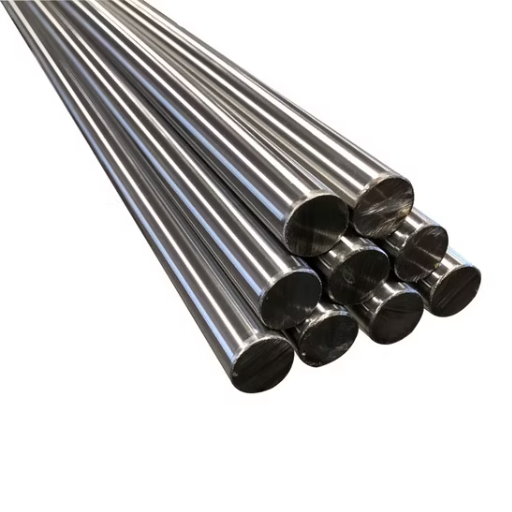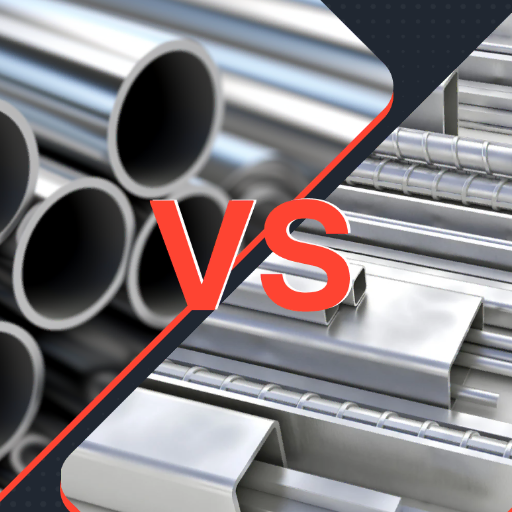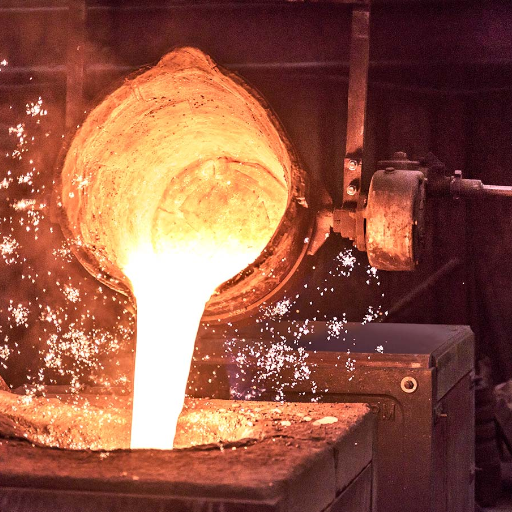Alloy Steel
Top Alloy Steel Manufacturer in China
Alloy Steel is a carbon steel enhanced with additional alloying elements like chromium, nickel, or manganese to improve its strength, hardness, and wear resistance. These added elements, typically in varying proportions, give the material unique properties, such as better corrosion resistance, improved ductility, and enhanced durability under high stress. Commonly categorized as low alloy steel and high alloy steel, these materials are widely used in applications like automotive parts, machinery, and tools. Whether you need standard or customized alloy carbon steel solutions, we deliver materials tailored to your exact specifications. Contact us today to explore how we can support your projects.
Access reliable and durable material tailored to meet your industrial needs.

Home » Alloy Steel

-
Characteristics of Alloy Steel
- Enhanced Strength: Combining elements like chromium, nickel, and molybdenum significantly increases tensile and yield strength, making it ideal for applications with high stress or load.
- Improved Corrosion Resistance: Certain high-alloy grades offer outstanding resistance to rust, oxidation, and chemical exposure, ensuring long-term reliability in harsh environments.
- Increased Hardness: Adding manganese and molybdenum enhances the material’s hardness, improving its durability against wear, abrasion, and frequent heavy impacts.
- Excellent Weldability: Low-alloy steels are easier to weld compared to other materials, providing dependable performance in structural and industrial construction applications.
High Ductility and Toughness: These steels maintain exceptional formability and impact resistance even under extreme stress or fluctuating environmental conditions.
- Heat Treatability: Most grades respond effectively to heat treatment, allowing precise control over properties like hardness, tensile strength, and flexibility.
- Customizable Properties: The wide variety of alloying element combinations enables the creation of materials tailored to meet specific requirements, such as increased corrosion resistance.
Alloy Steel Specifications Table
| Category | Details |
|---|---|
| Material Name | Alloy Steel |
| Common Grades | 4130, 4140, 4340, 6150, 8620 |
| Alloying Elements | Chromium, Nickel, Molybdenum, Manganese, Silicon, Vanadium, Tungsten |
| Standards | ASTM A335, ASTM A182, ASTM A193, EN 10083, JIS G4105 |
| Tensile Strength | ~500-1200 MPa (depending on grade and heat treatment) |
| Yield Strength | ~300-900 MPa (depending on grade and heat treatment) |
| Hardness (Brinell) | ~180-400 HB (depending on alloy composition and processing) |
| Corrosion Resistance | Good to excellent, varies with alloying elements and heat treatment |
| Product Forms | Sheets, Plates, Bars, Tubes, Pipes |
| Heat Treatment | Annealing, Quenching, Tempering, Normalizing |
| Applications | Automotive parts, construction machinery, tools, pressure vessels, pipelines |
| MOQ | 1 ton |
| Delivery Time | 10-15 working days |
| Packaging | Export seaworthy packing or customized packaging as required |
| Payment Terms | T/T (30% deposit, 70% balance before shipment) |

-
Alloy Steel Customization
We provide fully customizable solutions to meet the specific needs of your applications. Our customization options ensure optimal performance and precise compatibility, from composition adjustments to surface treatments.
Chemical Composition: Adjust alloying elements such as carbon, chromium, nickel, molybdenum, and vanadium to achieve the desired properties, such as increased strength, toughness, or corrosion resistance. Our customization adheres to ASTM, EN, and other international standards.
Heat Treatment: Available options include annealing, quenching, tempering, normalizing, and stress relieving. These treatments can be tailored to achieve specific hardness levels, tensile strength, or ductility required for your project.
Shapes and Dimensions: Offered in a variety of forms, including sheets, plates, bars, tubes, and pipes. Custom dimensions, such as thickness, length, diameter, and tolerances, can be provided to ensure a perfect fit for your application.
Surface Treatment: Improve durability and functionality with surface treatments, including polishing, galvanizing, and oxidation removal. Coating options such as anti-corrosion layers or protective finishes are also available to meet unique environmental demands.
Packaging and Logistics: Choose from waterproof wrapping, wooden crates, or customized packaging solutions to ensure safe transport. Our logistics team offers comprehensive support for global shipping, ensuring timely and secure delivery.

Comprehensive Overview of Alloy Steel Grades
| Grade | Strength | Hardness | Toughness | Corrosion Resistance | Heat Resistance | Applications | Carbon (C) | Chromium (Cr) | Nickel (Ni) | Molybdenum (Mo) | Other Elements |
|---|---|---|---|---|---|---|---|---|---|---|---|
| 4130 | High tensile and yield strength, suitable for stress-bearing applications. | Moderate, resistant to wear and abrasion. | Excellent ductility under high loads. | Good in mild corrosive environments. | Moderate, performs well under thermal stress. | Aerospace, automotive, and oil drilling | 0.28-0.33 | 0.8-1.1 | ~0.3 | 0.15-0.25 | ~0.2% Silicon (Si), ~0.04% Sulfur (S) |
| 4140 | Exceptional strength, ideal for heavy-duty use. | High, suitable for cutting and impact tools. | Retains toughness after heat treatment. | Good in harsh industrial environments. | High, retains properties at elevated temperatures. | Gears, shafts, and high-strength tools | 0.38-0.43 | 0.8-1.1 | ~0.15 | 0.15-0.25 | ~0.2% Silicon (Si), ~0.035% Phosphorus (P) |
| 4340 | Very high strength for demanding applications. | Excellent, resists deformation and wear. | Outstanding impact resistance. | Moderate, better than plain carbon steels. | Excellent, withstands high thermal loads. | Heavy machinery, crankshafts, axles | 0.38-0.43 | 0.7-0.9 | 1.65-2.0 | 0.20-0.30 | ~0.2% Silicon (Si), ~0.03% Sulfur (S) |
| 6150 | Superior strength with good elasticity. | High, ideal for torsion bars and springs. | Good toughness, retains elasticity. | Moderate, better with coatings applied. | Moderate, tolerates standard thermal exposure. | Springs, torsion bars, cutting tools | 0.48-0.53 | 0.8-1.1 | ~0.15 | 0.15-0.25 | ~0.2% Silicon (Si), ~0.1% Vanadium (V) |
| 8620 | Balanced strength for structural use. | Moderate, suitable for gears and pins. | High, excellent fatigue resistance. | Moderate, best with surface treatments. | Good, performs well under moderate heat. | Gears, pins, structural components | 0.18-0.23 | 0.4-0.6 | 0.4-0.7 | 0.15-0.25 | ~0.25% Silicon (Si), ~0.1% Manganese (Mn) |
This table provides a detailed comparison of commonly used grades, highlighting their mechanical properties, corrosion resistance, and heat performance. It also includes typical applications and chemical compositions, offering a complete guide to selecting the right material for your industrial needs.
Contact Us
Our experienced professionals are committed to providing personalized service and ensuring that you receive the right materials tailored to your exact standards. Simply contact us today, and we’ll be happy to guide you through the process and answer any questions you may have.
Latest Articles ※


Frequently Asked Questions
Need More Information? Feel Free to Contact Us
Q: What are the primary uses of 4140 alloy steel?
A: Known for its high strength, toughness, and excellent machinability, 4140 grade is widely used in the manufacturing of gears, shafts, and other high-stress components. It is particularly valued in industries like automotive and heavy machinery, where durability under load is essential. Additionally, its ability to be heat-treated makes it versatile for applications requiring precise mechanical properties.
Q: What makes 4340 unique compared to other grades?
A: 4340 alloy steel stands out for its exceptional toughness and fatigue resistance, even under extreme conditions. Its high nickel and chromium content enhances its strength and makes it ideal for critical components like crankshafts, axles, and connecting rods in aerospace and heavy equipment. This grade is often chosen when reliability in demanding applications is a priority.
Q: What are the advantages of using 4130 steel?
A: 4130 steel is a low-alloy material with excellent weldability and machinability, making it popular for lightweight yet strong structures. It is often used in aerospace applications, such as aircraft frames and roll cages, due to its balance of strength and ductility. Its corrosion resistance can be enhanced with coatings, expanding its usability in outdoor or mild corrosive environments.
Q: What is HSLA steel, and where is it used?
A: High-Strength Low-Alloy (HSLA) steel is engineered for high strength and improved resistance to atmospheric corrosion while maintaining good weldability and formability. It is commonly used in structural applications, such as bridges, buildings, and pipelines, where weight reduction without compromising performance is crucial.
Q: Does alloy steel rust?
A: While many alloyed grades offer enhanced corrosion resistance, they are not entirely immune to rust under certain conditions. For example, grades with higher chromium or nickel content, like 4340, resist rust better than others. However, environmental factors like exposure to saltwater or acidic conditions can accelerate corrosion if protective coatings or treatments are not applied.
Q: How do I choose the right grade for my project?
A: Choosing the right grade depends on the specific requirements of your project, such as strength, machinability, and environmental resistance. For example, the 4140 grade is excellent for heavy-duty applications, while the 4130 grade is preferred for lightweight structures. Understanding the operating conditions and mechanical needs will help narrow your options effectively.











